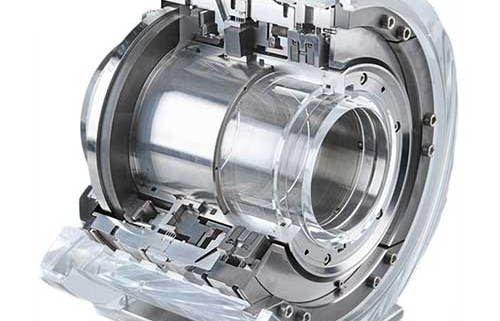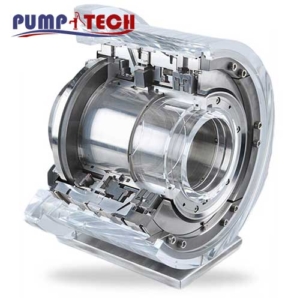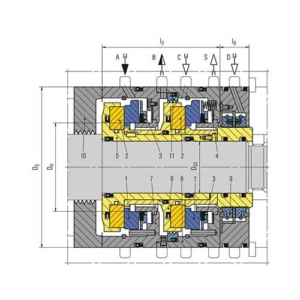

Features mechanical seal pdgs
- Gas-lubricated
- Uni-directional or bi-directional
- Elastomer-free
- Ready-to-fit cartridge unit
- Single, double, tandem seal and tandem with intermediate labyrinth available
- Separation seals as labyrinths, carbon rings or CobaSeal are optionally available
Advantages mechanical seal pdgs
- Wear-free and contact-free operation
- Self-cleaning 3D gas grooves
- High gas film stiffness
Secure cupped retainer for seat - Available in various materials for optimized chemical resistance
- Proven, reliable and economical solution

Operating range mechanical seal pdgs
- Shaft diameter:
Ds1 = 29 … 390 mm (1.14″ … 15.35″) - Pressure:
p = up to 650 bar (7.977 PSI) - Temperature:
t = -200 °C … +230 °C
(-328 °F … +446 °F) - Sliding velocity:
vg = up to 227 m/s (744 ft/s)
Materials mechanical seal pdgs
- Seal face: Silicon carbide with DLC coating
- Seat: Silicon carbide with DLC coating
- Secondary seals: Polymer rings
- Metal parts: 1.4006, 1.4313-QT650, Inconel® or other stainless steels.
Other materials on request.
| A | Primary seal gas supply |
| B | Primary vent |
| C | Secondary gas seal supply |
| S | Secondary vent |
| D | Separation gas supply |
| Item | Description |
| 1 | Seal face, stationary |
| 2 | Seat, rotating |
| 3 | Thrust ring |
| 4 | Spring |
| 5 | Shaft sleeve and seat retainer |
| 6 | Intermediate sleeve |
| 7, 8 | Housing (size matched to installation space) |
| 9 | Separation seal (CSR) |
| 10 | Labyrinth |
| 11 | Intermediate labyrinth |
Recommended applications seal pdgs Burgmann
- Oil and gas industry
- Refining technology
- Petrochemical industry
- Hydrocarbon gas
- Ammonia
- Nitrogen
- Refrigerants
- Air
- Centrifugal compressors
- Turbo expanders
- Blowers



